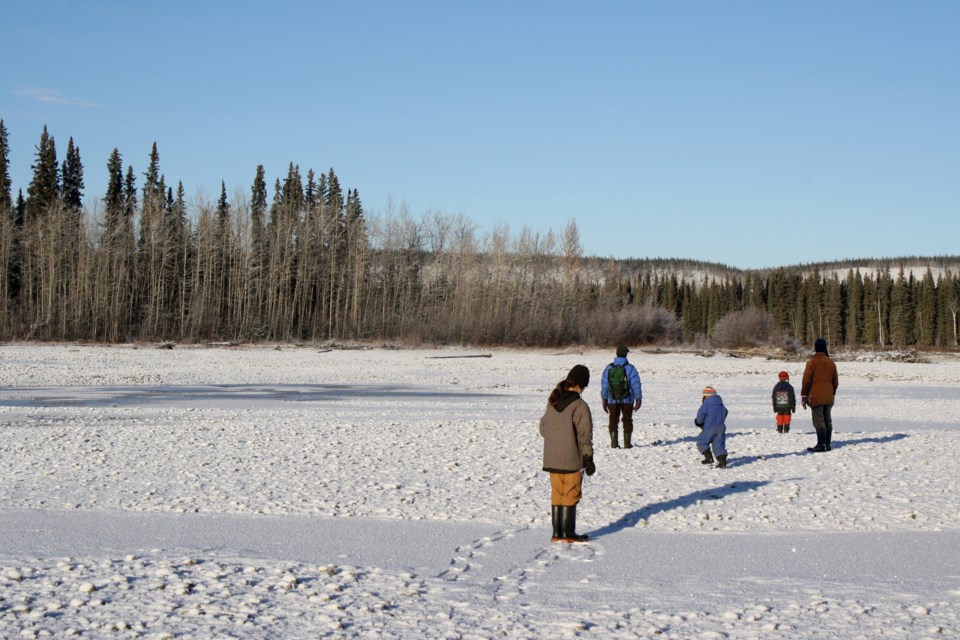A few years ago, Suzanne Crocker realized her family needed a break from just about everything.
Crocker – a rural doctor and mother to three children then aged 10, 8, and 4 – was increasingly bewildered by the distractions that dominated her family’s life in Dawson City, Yukon: packed schedules; assorted community projects; the trappings of screen technology.
“We tried all of the normal things where you try to protect time, like have a family day. I would even lock my laptop in the filing cabinet,” says Crocker in a recent phone interview. “We just found our minds were too much of the time elsewhere, even when we were in our off time.”
There was also the nagging feeling that time was moving too fast, and she needed to slow it all down somehow.
This feeling remained until Crocker realized that the most efficient way to re-focus her family was to step back from schedules and distractions for a while.
Together with her husband Gerard Parsons, their children, a trio of pets, and a vehicle full of supplies, Crocker set forth on an incredible journey: nine months in the bush, with no watches, no electricity, no neighbours, and no distractions.
You can see how the family fared for yourself in All the Time in the World, Crocker’s award-winning documentary that screens next week as part of the Reel 2 Real International Film Festival for Youth, a seven-day showcase of youth-friendly cinema.
Crocker didn’t set out to make a documentary. She purchased a camera six weeks before departure, intending to document the experience for friends and family who lived in the south (for our kin in the Yukon, “the south” refers to our part of the country).
“Up here, it’s not quite a novelty to go live in the bush, but down south, there was this incredible curiosity,” says Crocker. “I thought, ‘okay, not everyone understands this concept, so I will document it.’”
It wasn’t long before she realized that the footage would interest audiences beyond her network of family and friends.
The family took up residence in a rustic 18-foot by 18-foot cabin accessible only by boat (until the river froze, at which point the only option was snowmobile).
“There were lots of challenges in filming this, from having no crew to cold temperatures to batteries to low light,” says Crocker.
“The biggest challenge was this fine line that I had to walk as a director of this film and filmmaker and cinematographer, and not turning the experience into a film project.”
Despite the abundance of creature comforts they’d left at home (including hot water and toys), the family never felt deprived of anything, says Crocker.
“In our pre-bush house, which was full of toys meant to entertain kids, you’d often hear, ‘I’m bored, I don’t know what to do,’” says Crocker. “I never heard the words ‘I’m bored’ in the bush.”
There certainly was a lot to do in the bush: tap trees for syrup, build and maintain a bear cache, snowshoe and skate, watch the ice floes, bake pies using freshly picked berries, read to each other, improvise toys and games out of found material, and otherwise revel in the special qualities of each season, and each other’s company.
It’s been a few years since her family returned to the land of time and schedules, but Crocker says her children remain deeply impacted by their time in the bush.
“Since the bush, they really value their free time, and they really protect it,” she says. “They don’t want to be signed up for a million different things.”
Crocker recognizes changes within herself, too. “I have no timepiece on me, and I do it partly symbolically, but more so because I know how I was before, and without that timepiece, I can be in the moment better,” she says.
All the Time in the World is currently making the rounds on the festival circuit. It took home the prize for Most Popular Canadian Documentary at the 2014 Vancouver International Film Festival, and will soon screen at the venerable Hot Docs festival in Toronto.
The fact that the film has been so warmly received tells Crocker that, from a societal point of view, there’s hope for us yet.
“It demonstrates that people do have a longing for a simpler and less distracted life, and a recognition that real face to face interpersonal time with real live people is important.”
All the Time in the World
Screens April 11 and 14 as part of the Reel 2 Real Festival (and April 12-18 at Vancity Theatre outside of the fest). Details at r2rfestival.org and allthetimeintheworld.ca.


